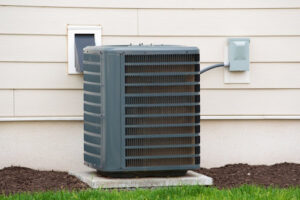
What Size Central Air Conditioner Do I Need?
When the heat of summer sets in, a central air conditioner becomes more than a luxury — it’s a necessity that stands between comfort and
When considering home improvement projects, upgrading your home’s electrical system probably takes a backseat to the backsplash or other trendy design projects.
We get that a shiny new electrical panel or a sturdy back-up generator isn’t exactly eye-catching. However, upgrades such as these are crucial in maintaining the safety and efficiency of your home.
Here are five electrical enhancements to protect your appliances and your family, ensure reliable power, and add convenience.
From your refrigerator to your home entertainment system, you have a lot of money invested in major appliances. All it takes is a sudden jolt of electricity from a lightning strike or a disruption in the grid to wipe out all of your devices and appliances.
A whole-home surge protector is mounted to the main panel box. It protects your home’s circuitry by redirecting excess current to the ground, sparing you from costly damage. This technology is more important than ever considering the growing number of devices you likely have plugged in at any given moment.
We recommend replacing your electrical panel ever 25 to 40 years. So if you’re living in an older home, it’s likely time for an upgrade. That’s especially true if you plan on installing a new appliance, such as a hot tub or HVAC system. Older electrical panels aren’t designed to meet the power demands of today’s homeowners.
Watch for these signs that your breaker box is due for a replacement:
Breakers frequently trip
The panel is warm or hot to the touch
It smells like something is burning
Lights flicker or dim
The panel uses fuses
Ask your electrician if it’s time to trade up from a 200- to 400-amp electrical panel.
In Houston, we know a thing or two about tropical storms. If the power goes out during a hurricane, a whole-house generator will keep the lights on and all of your major appliances running. It kicks on automatically so that there’s no disruption in service and powers down when the electricity is restored.
It’s not an exaggeration to say a whole-house standby generator can be a lifesaver. Catastrophic events can cut the power to your home for days, which means any medical devices that require an outlet will be out of commission as well.
In short, a whole-house generator will keep your family safe.
Ground-fault circuit interrupters (GFCI) look like standard power outlets except that they say “Test” or “Reset.” They monitor the electrical input and shut off the power in a when they detect a ground fault — that’s when the electricity takes an unplanned turn toward the ground.
If you come into contact with a damaged wire or power outlet, you can be the conduit for the electricity to reach that ground. (That’s called electrocution, folks.) True to its name, a GFCI interrupts this stray electricity for your safety.
The National Electric Code began requiring GFCI outlets in homes in 1971. If your home is older and it hasn’t undergone any significant remodeling, you likely have outdated outlets. Have an electrician replace them where necessary with GFCI receptacles.
First, you have to plug the USB adapter into the outlet. Then you have to plug in your device. It’s a hassle.
A USB outlet has — you guessed it — USB ports built in so that you don’t have to deal with those clunky adapters. They’re convenient. Also, they charge your devices up to 40% faster than adapters. Plus, you’ll free up your three-prong outlets for appliances and gadgets that need them.
Bottom line: The right electrical upgrades make your home safer, more efficient, and more attractive to potential buyers. At Universal Home Experts, we’re committed to bringing you the highest level of customer service. To schedule an appointment, call (713) 364-0226.

When the heat of summer sets in, a central air conditioner becomes more than a luxury — it’s a necessity that stands between comfort and

Every homeowner has experienced it at one point or another: the water in the sink takes forever to drain, the shower floor is covered in

Lightning strikes can be a terrifying experience for any homeowner. The powerful boom and bright flash are unmistakable, leaving you to wonder about the safety